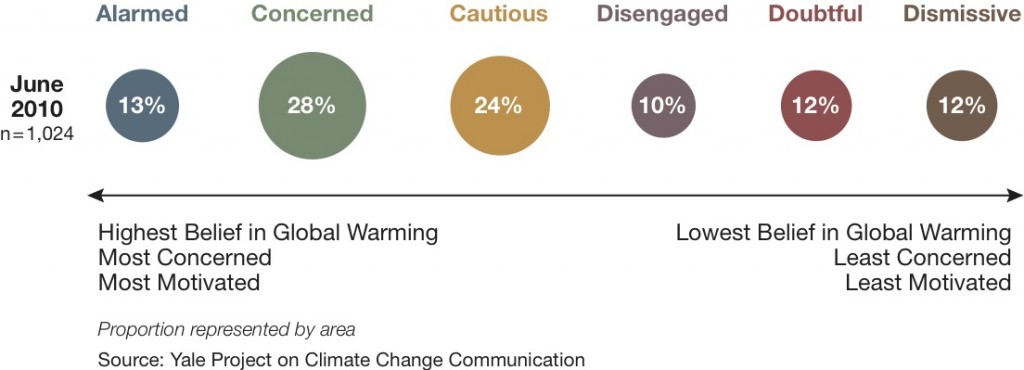As divisive issues go, global climate change is a bit unusual. Often when there is a controversy, it’s because scientists disagree. However, as far as the human origins of climate change, there is actually almost no debate about the core issue; nearly all scientists, and all major scientific bodies, agree that the climate is changing and the primary causes are “anthropocentric” – that is, caused by human activity.
But the way much of the the American public sees it is very different. Evidence for just how diverse our views are comes from a scientific survey of the American public conducted by the Yale Project on Climate Change Communication, which looked at “The Six Americas” and how their beliefs on climate change vary.
The study found that there are six distinct audiences in the United States, each of which responds to global warming in different ways. The figure below (from the report) shows the six types and the percentages of Americans in each type.

In general, the Alarmed and the Concerned are more likely to answer questions about climate change correctly than the other groups. Whereas 98% of the alarmed say global warming is happening, only 12% of the Dismissive accept this fact. Similarly, 87% of the Alarmed understand that global warming results mostly from human activities, compared to 3% of the Dismissive.
The same pattern is found on one of the most objective facts about global warming: the degree of scientific consensus. Of the Alarmed, 79% understand that most scientists agree that global warming is actually happening, as do 54% of the Concerned. However, only 16% of the Doubtful and 7% of the Dismissive think that most scientists agree on this issue.
But the study also found that all groups have misconceptions about global warming, indicating that many Americans know relatively little about climate change. Given that this is one of the most important issues of our time, getting scientifically accurate information out to the public clearly should be a high priority. Understanding how the “Six Americas” differ in their views can help target the information where it is needed most.



Speak Your Mind